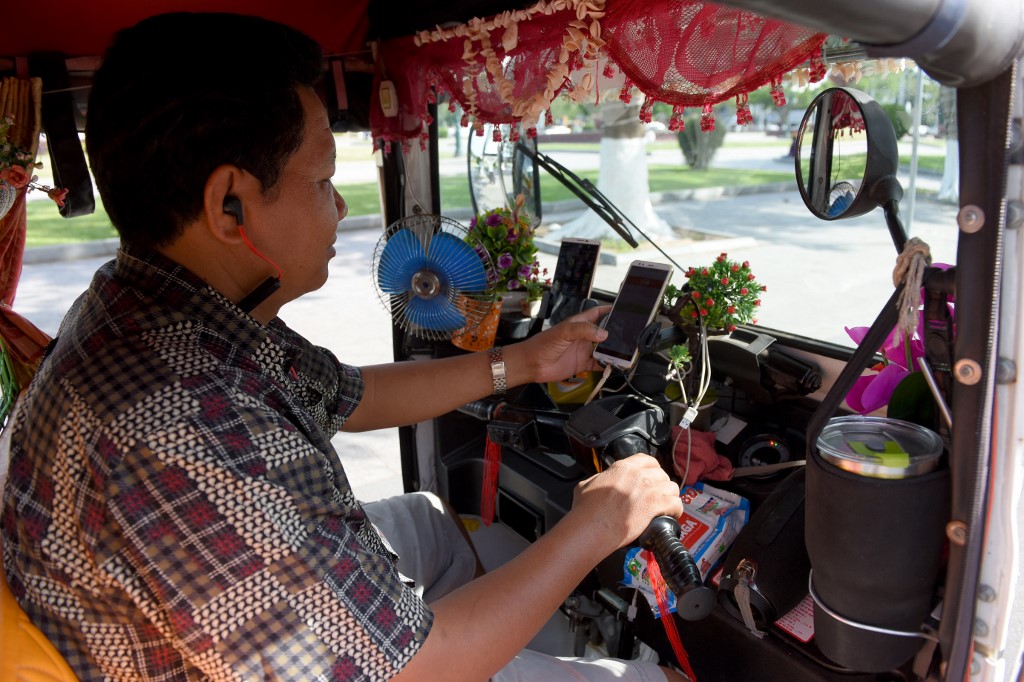At 62 years old Pak Chhen still rises early, often before the sun is up, to travel the rutted roads to Kampot’s sea salt farms, where she procures bulk packages of the product that is destined for markets across the southern province.
And while at first glance the process appears to have changed little from when Chhen’s own parents started the family business selling Kampot salt decades ago, her 30-year-old daughter, Thyda, has introduced some innovative digital tools that are helping bring this ancient industry into the 21st century.
“Stemming from a family business, you have to go to a new model, a new style of business,” Thyda said, explaining the need to evolve in the face of a changing landscape. “You have to manage yourself in a new way to adapt to digitisation.”
But as Thyda and her family work to prepare themselves for the 4th Industrial Revolution (4IR), millions of Cambodia’s informal workers look likely to be left behind. But while technology and automation currently pose an existential threat for these workers, some of Industry 4.0’s innovations may still hold the potential to combine tradition with technology, expanding their stake in the economy and a transition to more formalised work.
In February, Konrad Adenauer Stiftung (KAS), a German political science think tank operating in Cambodia since 1994, published Sustainability and Digital Innovation, a report on the present and future of digitisation in the Kingdom, revealing concerns over the country’s informal workers.
Through interviews with 36 Cambodian workers employed in occupations with a high risk of being made redundant by 4IR – including informal workers like market sellers and other micro, small, and medium-sized enterprise (MSME) operators – the report identified limited education and a lack of understanding of Industry 4.0 as posing the greatest risk to this chunk of the workforce.
“Digitalization is a threat to the inclusive labor market,” the report said. “But it is also a possibility, as technologies can provide vulnerable groups new employment opportunities and an easier way to upgrade their skill levels.”
While more dramatic shifts in skillsets and reentering formal education is unlikely for this segment of the workforce, it doesn’t mean that technology cannot play an important role in their current and future occupations.
For these informal workers – broadly defined as unregistered businesses, those employed by registered businesses without contracts, and MSMEs operating out of homes and shopfronts – it is the more mundane digital tools that will have the most impact in the coming years.
Thyda’s use of digital fintech services for Thaung Enterprise, her family’s small salt-producing agricultural business that employs 16 people, provides one example of how 4IR innovations can impact informal businesses in Cambodia.
“We have a new model, a new structure, a new way of selling our product,” Thyda explained. “We have a profit margin that is higher than with the traditional way of selling.”

With a Master’s Degree from the Royal University of Economics and Finance, in 2017 Thyda realised the power of technology and how it could provide a path forward for the sea salt business her grandparents started more than 50 years ago.
Taking advantage of the suite of services provided by BanhJi – a local fintech firm that works primarily with micro, small and medium-sized businesses in urban and rural Cambodia – Thaung Enterprise has updated its accounting methods and now uses online payroll services, account tracking, and data management tools to create a more comprehensive picture of business operations than was possible with traditional pen and paper bookkeeping.
However, this technological upgrade required adjusting attitudes, with Thyda’s parents in need of convincing.
“It was a little bit hard at the beginning for them,” she said. “Digital [tools] make it easier and more convenient to control our stock, control our business and our management … but they [her parents] are still more familiar with the systems that they did every day.”
After winning her family over, other benefits of these new digital tools soon became apparent. Along with providing operational services, BanhJi also works with local banks to facilitate non-collateralised loans for participating businesses by building alternative credit scores based on their engagement with the platform.
The funds that Thyda was able to access through her participation with BahnJi allowed Thaung Enterprise to expand operations, upgrade its packaging and marketing departments and register with the government, bringing a new level of legitimacy to a very old business.
“We want to be a formal enterprise so we can be accepted in every market [globally],” she said. “If you aren’t in the formal world they [international buyers] will not accept you, even if you have a good product or a good service.”
Right now there is no incentive for them to join the formal economy. The fear around taxes and all of that [registration and compliance costs] makes it really difficult for them
Cambodia, like the rest of the world, must prepare itself for the growing sea change brought on by digitisation and, given the size of the country’s informal economy, neglecting this sector could have serious consequences.
According to the 2018 Women and Men in the Informal Economy: A Statistical Report produced by the International Labor Organization, more than 90% of Cambodians participate in the informal sector, meaning that any large-scale strategy must take these workers into account if the Cambodian economy is to thrive.
Addressing the changing economic landscape, the 2021-2035 digital policy framework currently being drafted by the Cambodian government is focused on “developing digital infrastructure, fostering digital trust and confidence, creating digital citizens, building the digital government and promoting digital businesses”.
As part of this larger roadmap, in 2020, the Cambodian government launched a single window, online business registration platform as a way to improve access to the formal economy for business owners large, small and micro in the Kingdom. This digital service allows MSME operators to register with multiple ministries at the same time, reducing onboarding costs and simplifying the complicated compliance procedures that often discourage informal operators from entering the formal economy.
But obstacles remain. In particular, tech expert and CEO of BahnJi, Sim Chankiriroth, believes that there needs to be more explicit benefits provided to informal workers to enter the formal economy.
“Right now there is no incentive for them to join the formal economy,” he explained. “The fear around taxes and all of that [registration and compliance costs] makes it really difficult for them to see the need to join the formal economy.”
But he remains hopeful, believing the adoption of mobile apps and eWallets can help informal workers expand their stake in the economy once the motivation catches up with the technology.
“It’s about access to a new revenue channel,” he said. “Tapping into a digital platform allows them to access a new source of revenue that they haven’t had access to before.”
The buzz of three-wheeled traffic in Phnom Penh acts as living testament to the impact that technology has had on another traditionally informal industry.
Since 2012, Po, a tuk-tuk driver, has driven more than an hour every day to the capital’s riverside area from his home on Koh Dach in Kandal province, transporting locals and tourists to provide for his family while maintaining the freedom of an independent business operator.
Two years ago, seeing the influx of Passap branded vehicles in the city, Po made the decision to trade in his traditional, more cumbersome remorque auto-rickshaw, sign up with the Cambodian ridesharing firm and test his luck on the rising digital tide.
“The small one [tuk-tuk] is faster and easier to drive, and more people like them,” he said. “I sold my [remorque] and still had money left over after I bought the new one.”
While the practical reasons of price, speed, and popularity may have been key motivators for his choice to join the rideshare app, the digital payments meant Po had to open a bank account to accept the money for the rides that are organised and tracked using his smartphone, adding a level of financial formality that his business had previously lacked. As more banks and companies like BahnJi work with the informal sector, building this relationship with a financial institution could eventually help Po access capital through a loan programme.
Using the app has introduced Po to a new way of expanding his stake in the market, and the tangible benefits – both for himself and the customer – have proven to him, in very real terms, that technology can be profitable.
“People like the app because they know how much a ride will cost before they get in. They don’t have to negotiate with the driver,” he said. “They also like it because if they forget something in the Passapp or have a problem, they can call the company to help.”

Like Passapp branded vehicles, mobile payment QR codes are a relatively new but increasingly common sight in Phnom Penh, reflecting another change in Cambodia’s economic landscape.
According to a recent UNESCAP report, the explosion of digital payment platforms and mobile banking services saw the number of eWallets increase by 64% between 2018 to 2019, and the value of mobile money transactions climb from 74.5% of Cambodia’s GDP in 2017 to 131% in 2019.
These electronic payment platforms provide another introduction to digitisation for informal business operators. Although, for 38-year-old Nat and her coffee stand in Phnom Penh’s Steung Meanchey neighbourhood, there are more immediate and practical reasons for using a digital payment system.
“I don’t have to carry a lot of money when I am working,” she said, explaining the added convenience of digital transactions. “The money just goes to my bank.”
Allowing her to keep less cash at her small, street-side coffee stand simplifies the dozens of transactions she makes during long hours working on her own, while the mobile banking app also helps her build a financial history with a bank which could secure her access to loans in the future.
However, Nat’s real motivation was the popularity of digital payments among her patrons, as Cambodian youth increasingly embrace cashless transactions.
“Now all the young people use the apps to buy things,” she said. “Sometimes they don’t even have the money, just the phone.”
While rideshare apps, mobile banking, and eWallets may not be the end-all-be-all in terms of 4IR technology, they can play an important role in the context of Cambodia’s informal workers. These smartphone-based services could help lay the foundations of digital literacy for a population with little-to-no formal technology education, serving as a gateway to utilise more advanced and influential digital tools further down the road.
For Nat, the enthusiasm for eWallets and digital payments among the capital’s population made the decision to utilise these digital tools easy, and the benefits of accepting digital payments at her coffee stand continue to pay off.
“Having the app is easy,” Nat said. “And it helps my business.”
This story is the fifth in a series produced in partnership with UNDP Cambodia, which will, over the coming months, aim to drive national dialogue on the future of innovation, youth employment and skills development in the Kingdom.



